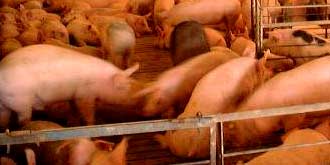Family Farms and Pork Exports

 5:09
Kelly McEvers
5:09
Kelly McEvers
Higher pork exports lower small farm profits.
Broadcast: Jul 14 2005 on NPR Day to Day Subjects: Business, Acoustic
Profile: Reduction in number of Midwestern family farms raising pigs
July 14, 2005 from Day to Day
MADELEINE BRAND, host: In a few minutes, how an accordion saved the life of a Cambodian refugee.
But first, pork--and not just the political kind--has made a comeback in the last year, mainly due to increased exports to countries like China and Russia. But the beneficiaries of this comeback are mainly large food corporations, not the family farms that once dominated the pork industry. According to the University of Missouri, seven years ago, small farms made up a third of the industry; now they account for just 1 percent. Independent producer Kelly McEvers has the story. KELLY McEVERS reporting: I'm standing on Lynn Road, which is in Cass County, Illinois, smack dab in the middle of Illinois. On the right of the road is a big cornfield. Beyond there is what once was a pretty big pig-farming operation. It belonged to the Brauer family. In any given year, the Brauers would put out 25,000 pigs, and that was their livelihood for many generations. (Soundbite of dog barking) Mr. BOB BRAUER (Former Pig Farm Owner): No, you stay outside. You stay outside. McEVERS: Bob Brauer and his wife, Crystal(ph), are into animals. They have three dogs, and there's pig paraphernalia everywhere: license plates that say `OINK,' a pig toaster cover and momentos from the old family farm that was settled by Bob's German ancestors. Mr. BRAUER: My great-great-grandfather, Frederick Brauer(ph), came to this country in--I believe it was 1837. And actually, I've got a picture of his farmstead. You can see there that he had horses, obviously, to till the ground, but he also had cattle and pigs and chickens. McEVERS: In the 1960s, Midwestern farmers began focusing on single commodities, like pigs. Bob's uncle, George Brauer, was one of the first hog farmers to bring his pigs inside to protect them from the elements and disease. Mr. BRAUER: He had a great respect for the animal and felt that if that critter was providing us our livelihood, it was our complete obligation to give that animal the best care possible. McEVERS: Over time, the Brauers did well and eventually doubled the size of their operation. But just as they did, meat-packing companies started raising their own pigs. In 1998, too many hogs on the market drove prices down, lower than they had been during the Depression. Mr. BRAUER: At that point, we'd been in business 22 years. The lowest I'd ever seen is $28. And unfortunately, the prices got down to $8 that year. McEVERS: Then the Brauer farm took another hit, a virus that causes sows to abort their young. To survive the outbreak and the price crash, pig farmers either had to sell out to bigger companies, hold out hope that things would get better or specialize in up-market cuts of pork. Mr. BRAUER: As people have more money, then they could be more picky about their food and they could demand certain qualities. McEVERS: Qualities that Bob said were too expensive to market. So he and siblings held out hope that their profits would bounce back; they didn't. Mr. BRAUER: We said, `Well, after you beat your head against the wall long enough, after awhile it's time to find a different wall to beat your head against.' So we decided that at that point, it was time to get out of the business, and that's what we did. McEVERS: The company partnered with food giant Cargill--recently bought the Brauer farm to produce antibiotic-free pork. Now the last of the Brauer land is for sale, even the house where Bob and Crystal live. Bob says he just doesn't want to drive by the farm anymore. More so than the land, though, Bob says he'll miss the work. Mr. BRAUER: I mean, I just--I just really loved being a pig farmer. About half my job was management and doing budgets and working with bankers, and then the other half of my time was taking care of pigs and fixing stuff. So I got to work with my mind and my brawn. And now I'm taking a shower at the beginning of the day instead of the end of the day and I'm not convinced that's an improvement. McEVERS: At the age of 50, Bob Brauer is starting a new job as a financial adviser. He tells people it's good to be in business for yourself, but always have a backup plan. For NPR News, I'm Kelly McEvers. (Soundbite of music) BRAND: NPR's DAY TO DAY continues. I'm Madeleine Brand.
